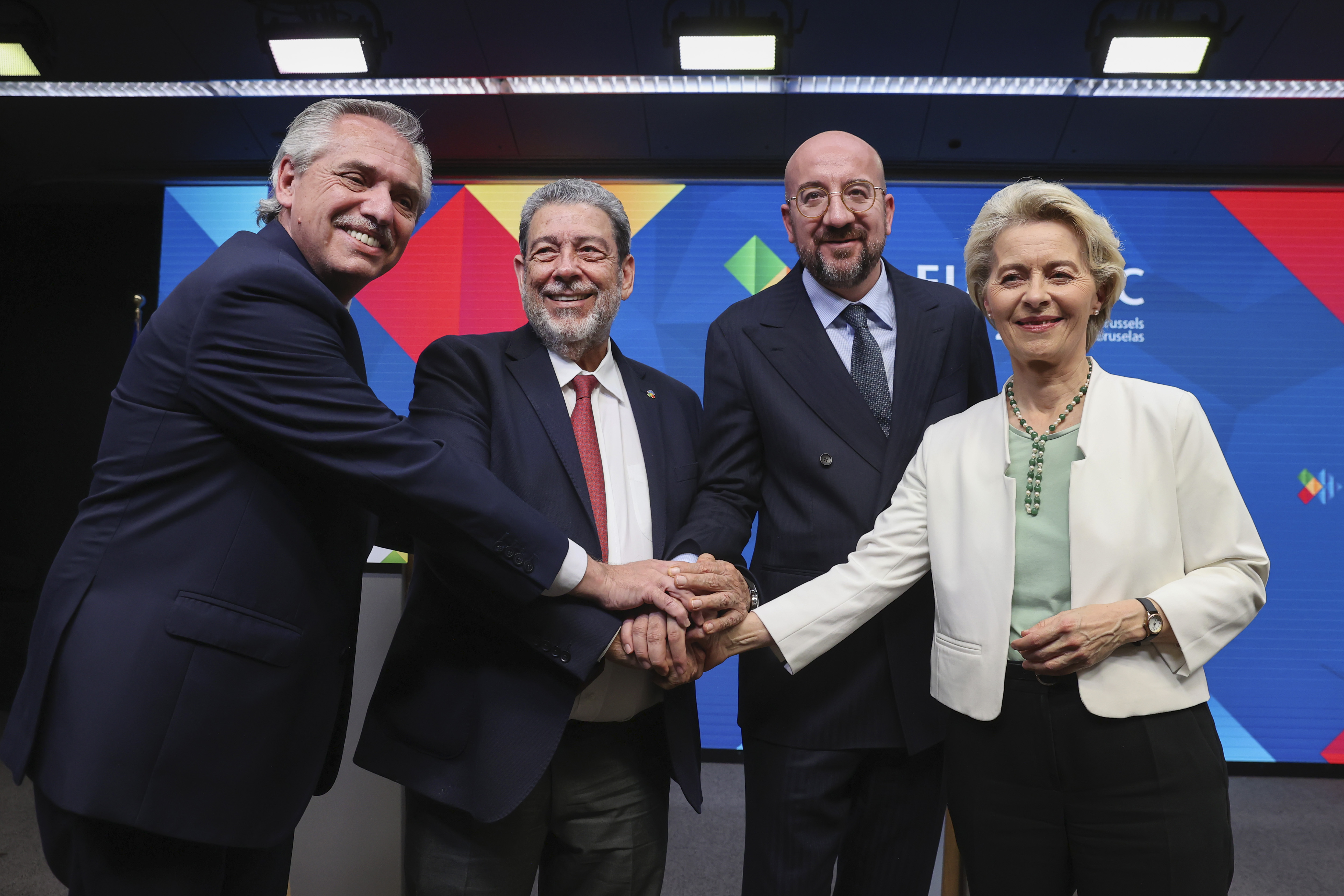CELAC-EU Summit
Washy declaration and missed opportunity with MERCOSUR

President Alberto Fernandez of Argentina, Prime Minister Ralph Gonsalves of Saint Vincent and the Grenadines, President of the European Council Charles Michel and President of the European Commission Ursula von der Leyen after a joint press conference at the end of the third EU-CELAC Summit in Brussels, attended by the Heads of State and Government of the EU and the Community of Latin American and Caribbean States.
© picture alliance / ASSOCIATED PRESS | Francois WalschaertsIn the end, there was a final declaration of the EU and the CELAC, the Community of Latin American and Caribbean States, at their summit this week in Brussels. During the first meeting in eight long years, hours were spent negotiating a common statement on Russia's aggression against Ukraine, intensified cooperation on equal terms, and free trade agreements. However, there were few clear statements and outlooks, except for the intention to meet every two years from now on.
The influence of autocratic regimes in Latin America is huge
This was mainly due to Venezuela, Cuba, and Nicaragua, which still maintain close ties to Moscow and refused to explicitly name Russia as an aggressor in the joint statement. In the end, all participating states, except Nicaragua, signed expressing "deep concern about the ongoing war in Ukraine, which continues to cause immeasurable human suffering and exacerbates existing vulnerabilities in the global economy." Russia was not mentioned at all.
The bargaining over this wording clearly shows what we should have known for some time now: Europe's influence in Latin America and the Caribbean is limited. In contrast that of China and Russia is growing and flourishing. Through close political exchanges and direct financial investments, China and Russia have gained influence in the region, while the EU, at best, has been asleep.
Felix Maradiaga, former presidential candidate in Nicaragua and long-time partner of FNF, was released on February 9, 2023, after 611 days of illegitimate detention by the Ortega regime, his citizenship was revoked, and he was deported to the USA. This week, he attended the summit in Brussels to represent Nicaragua's democratic civil society. He sees a competition of systems between the autocratic regimes of Russia and China on one hand and the democratic European Union on the other:
The dictatorships in countries like Nicaragua, Venezuela, and Cuba should not be seen as isolated problems but as part of a global problem connected to the autocratic advance of China and Russia. The European Union cannot stand idly by.
Approximation through economic cooperation at eye level
One way to intensify cooperation, build bridges, and spread democratic and liberal values is economic cooperation. Although intent declarations for bilateral agreements were made in Brussels at the beginning of the week – for example, with Chile on lithium and green hydrogen, which is an important step for future innovations in technology and green transformation – it is still unclear whether and when the largest free trade zone in the world, MERCOSUR, will be created. The hoped-for breakthrough did not happen. Instead, there is now hope for a conclusion by the end of the year.
One of the sticking points: Some European countries, especially France and Austria, are demanding stricter environmental regulations. Whether these relatively new demands are genuinely about climate protection or rather protectionism towards domestic farmers is debatable. However, the MERCOSUR countries – Brazil, Argentina, Uruguay, and Paraguay – are not willing to accept these European demands easily.
And here lies precisely the problem in the relations between Europe and Latin America: Instead of bringing the long-discussed MERCOSUR agreement to a positive conclusion, some EU member states want to impose our European standards and perspectives on the so-called developing countries in South America. It is often forgotten that Brazil produces renewable energy in an amount of 7 percent with a renewable energy mix of 85 percent in its own country, despite having a 2 percent share in the world's economy. While it is essential to focus on our environment and human rights and work towards improving their standards worldwide, the best approach is through cooperation on equal terms and economic development through a free market. Without an agreement, nothing is gained. Neither environmental standards nor human rights will improve without it. The opposite. Improvement in standards can be promoted through shared regulations and institutions in international agreements. The EU has just missed another chance to do so.
